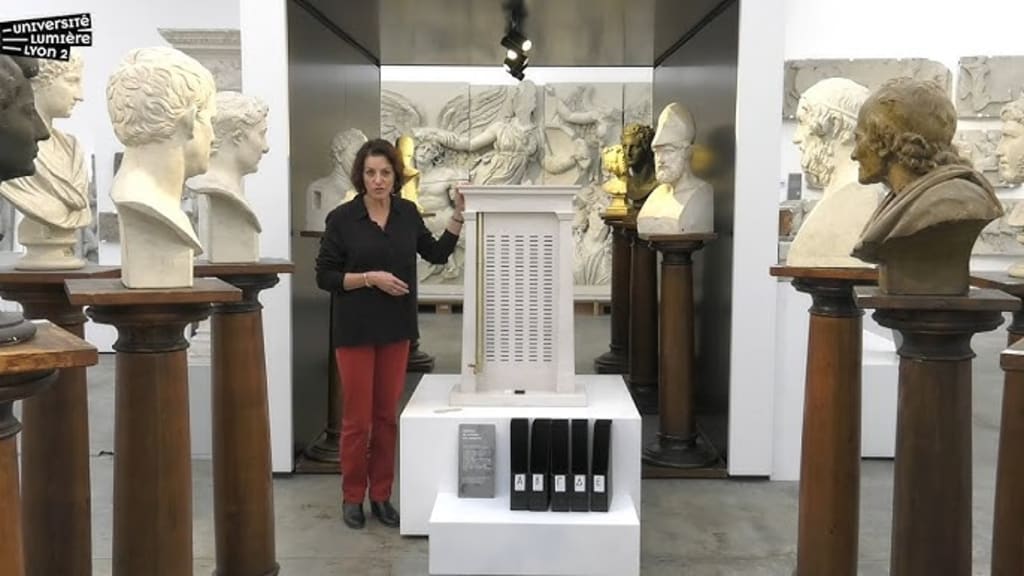The MACHINE that Selected the Citizens of Athens | Greek Kleroterion
History

The kleroterion, an ingenious device used in ancient Athens, played a crucial role in the democratic process by ensuring fair and random selection of citizens for public duties. This unique artifact exemplifies the commitment of the Athenians to the principles of equality and civic participation. This article explores the origins, design, operational mechanism, historical significance, and enduring legacy of the Greek kleroterion.
Origins and Historical Context
The kleroterion was developed in the 5th century BCE during the height of Athenian democracy. The democratic system of Athens required a method to randomly select citizens for jury service, public offices, and various other civic duties. The kleroterion provided a means to achieve this randomness, thus preventing corruption and ensuring that all eligible citizens had an equal opportunity to participate in governance.
Design and Operational Mechanism
The design of the kleroterion was both simple and effective, reflecting the ingenuity of ancient Greek technology and their dedication to democratic fairness:
- Structure: The kleroterion was a tall, rectangular slab of stone or marble with a series of slots or columns carved into its face. Each column was divided into numerous small slots capable of holding small tokens or pinakia (bronze or wooden identification plaques).
- Tokens (Pinakia): Each citizen eligible for selection had a pinakion inscribed with their name. These tokens were inserted into the slots of the kleroterion.
- Randomization Process: To randomize the selection, a tube or funnel-like device called a kleroterion was used to dispense black and white pebbles or bronze dice. These were released one by one through a mechanism, such as a rotating wheel or a tilting tube.
- Selection: As the pebbles or dice were dispensed, they would correspond to the rows of pinakia. For example, if a white pebble (indicating selection) fell out for a particular row, the individuals in that row were chosen for service. Conversely, a black pebble (indicating non-selection) meant that those in the corresponding row were not selected.
Historical Significance
The kleroterion was integral to the functioning of Athenian democracy, ensuring fair participation and preventing the consolidation of power among the elite:
- Democratic Fairness: The use of the kleroterion exemplified the Athenian commitment to democratic principles, ensuring that public offices and jury duties were filled by random selection rather than by wealth or influence.
- Civic Participation: By randomly selecting citizens for public duties, the kleroterion fostered a sense of civic responsibility and engagement among the population, reinforcing the idea that every eligible citizen had a role in governance.
- Anti-Corruption Measure: The randomization process minimized the potential for corruption and manipulation, as it was difficult for any individual or group to influence the outcome of the selection.
Technological Mastery
The kleroterion was a product of advanced technological understanding and craftsmanship in ancient Greece:
- Precision Engineering: The construction of the kleroterion required precise carving and alignment to ensure that the slots could accurately hold the pinakia and that the randomization mechanism operated smoothly.
- Mathematical Principles: The design and operation of the kleroterion reflected an understanding of probability and randomness, key principles that are foundational to modern statistical and mathematical sciences.
Enduring Legacy
The legacy of the kleroterion extends beyond its historical context, influencing later democratic practices and serving as a symbol of Athenian ingenuity:
- Influence on Modern Systems: The concept of random selection for public duties influenced later democratic systems and practices. Modern jury selection and other forms of civic duty lotteries can trace their roots back to innovations like the kleroterion.
- Archaeological Importance: The discovery and study of kleroteria provide valuable insights into the mechanisms of ancient Athenian democracy. These artifacts offer a tangible connection to the political practices and civic culture of classical Athens.
- Symbol of Democracy: The kleroterion remains a powerful symbol of democratic ideals and the Athenian commitment to fairness, equality, and civic participation. It is frequently referenced in discussions about the origins and evolution of democratic governance.
Conclusion
The Greek kleroterion stands as a remarkable testament to the ingenuity and democratic spirit of ancient Athens. Its design and operational mechanism exemplify the Athenians' commitment to fairness and civic responsibility, ensuring that public duties were accessible to all eligible citizens. As a symbol of democratic innovation, the kleroterion continues to inspire admiration and scholarly interest, highlighting the enduring legacy of Athenian democracy and its influence on modern political systems. By studying the kleroterion, we gain valuable insights into the foundational principles of democratic governance and the technological advancements that supported these ideals in classical antiquity.
About the Creator
Marveline Merab
“History never repeats itself. Man always does.”
― Voltaire
Enjoyed the story? Support the Creator.
Subscribe for free to receive all their stories in your feed. You could also pledge your support or give them a one-off tip, letting them know you appreciate their work.






Comments
There are no comments for this story
Be the first to respond and start the conversation.